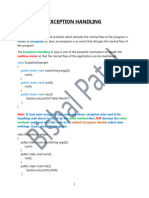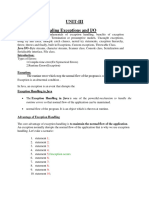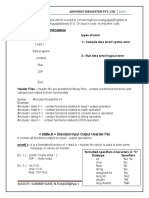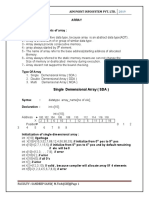Exception Handling in Java: Aimpoint Infosystem Pvt. LTD: Java Notes 2019
Uploaded by
Sandeep sahuException Handling in Java: Aimpoint Infosystem Pvt. LTD: Java Notes 2019
Uploaded by
Sandeep sahuAimPoint InfoSystem Pvt.
Ltd : java Notes 2019
Exception handling in java
Generally there are two types of error occurs in a program.
1. Compile time error:-
Whenever any syntax error occurs in a program at compile time , that program not get
compiled properly and java compiler doesn‟t create .class file and these types of error
called “compile time error”, and these types of error shows by the compiler and can be
easily repaired by Programmer.
Some common example of compile time errors :-
Missing ; ( z = x + y )
Mismatching of brackets . ( x + y – ( k – 10 )
Misspelling of keywords and identifier . ( Int x ; )
Undeclared variable .
Misplace operator . ( z = a b )
Assigning incompatible value ( float y = 13.6 ; )
2. Runtime error:-
Sometimes a program may compiled properly & also creating .class file , but not
executing properly so in this case always shows wrong output due to our wrong
logic .these types of error is called “runtime error”. And Run time errors doesn‟t
display by compiler. We can debug runtime errors in the testing of programs.
Some common example of run time errors:-
Dividing any integer by 0. (Assigning ∞ value)
Accessing element from out of bound of array.
Example
int x [ ]=new int[ 5 ] ;
x[10]=50;
Assigning incompatible value in array.
Example
int X = Integer.parseInt( “215” ) ;
int X = Integer.parseInt ( “Hello” ) ; //invalid (cannot convert)
Passing values in function but these are not in the range.
Converting invalid string into number.
Example
int x ; x = ”215”; x = ”hello”;
Faculty : Sandeep Sir ( M.Tech ph : 9425007241) Page 1
AimPoint InfoSystem Pvt. Ltd : java Notes 2019
Exception handling in java:-
Whenever any unexpected error comes at runtime this is called exception &
“exception handling” is a mechanism to handle these runtime errors.
In java whenever any runtimes errors comes at runtime java compiler
automatically create “Exception“(class) object & throws it. If “Exception“ object
is not caught and handled properly, in this case java interpreter display message
and program will be abnormally terminated. If we want to continue the program
with remaining code, we should try to catch these “Exception” object throws by
exception or error and should handled properly.
Steps for exception handling in java
Hit the exception
Throw the exception
Caught the exception (catch)
Handle the exception.
try
Exception
Occur
catch
Catch exception &
handled it
Exception handling managed in java by following keywords.
Constructs keyword statement keyword
try catch finally throw throws
Faculty : Sandeep Sir ( M.Tech ph : 9425007241) Page 2
AimPoint InfoSystem Pvt. Ltd : java Notes 2019
“try” :-
It is a block & containing statements in which error can be occurs.
If once control come out of the “try” block using throwing the exception then
control doesn‟t comes to the “try” block.
In a method multiple try blocks and nesting of “try” block is also possible.
“catch” :-
It is a block (in c++ it is a statement) & used to catch the exception which is throws by
“try” block.
“catch” block must be written just after “try” block.
“try” block must be followed by at least one “catch” block.
Multiple “catch” blocks can be associate with a single “try” block.
“catch” block always take arguments of a “Exception” class ( or derived class of
“Exception” class).
“catch” block executed, if it is receiving exception otherwise not executing.
Structure of exception handling
try
{
............
............
throw exception ;
..............
throw exception ;
..............
}
catch (Exception a)
{
..................
...................
}
catch(Exception b)
{........................
.......................
}
Faculty : Sandeep Sir ( M.Tech ph : 9425007241) Page 3
AimPoint InfoSystem Pvt. Ltd : java Notes 2019
Types of exception in java
Built in or compiler defined exception.
User defined exception
Note:-all built in exception defined in “java.lang.Throwable” class (super
class) & “Exception” class (sub class)
Built – In Exception In Java ( Compiler Defined Exception Classes)
1. ArithmeticException (division by zero)
2. ArrayIndexOutOfBooundsException (bad array index)
3. ArrayStoreException (wrong type of data into array)
4. FileNotFoundException (attempt to access is not exist file)
5. IOExeption (failure reading from file)
6. NullPointerException (reference point to the null object)
7. NumberFormatException (conversion bit string and number)
8. OutOfMemoryException (not enough memory for new data)
9. StackOverflowException (system runs out of stack memory)
10. StringIndexOutOfBooundsException (bad string character)
//WAP to show exception in case of zero divide
class ZeroDivide1
{
public static void main( String a[ ] )
{ System.out.println("Start");
int x = 15 , y = 0 ;
int z;
z= x / y ;
System.out.println(" Division = "+z ) ;
System.out.println("End");
}
}
//WAP to handeled exception in case of zero divide problem
class ZeroDivide2
{
public static void main( String a[ ] )
{
int x = 15 , y = 0 , z ;
System.out.println(" START ");
Faculty : Sandeep Sir ( M.Tech ph : 9425007241) Page 4
AimPoint InfoSystem Pvt. Ltd : java Notes 2019
try
{
z= x / y ; // automatically throw "ArithmeticException"
System.out.println(" Div = "+z);
}
Catch (ArithmeticException e)
{
//System.out.println(" Sorry ..... Divide By Zero " ) ;
//or//
//System.out.println(e.getMessage() ) ; //msg by getMessage() method
//or//
e.printStackTrace( ) ;// for display detail msg
}
System.out.println("END");
}
}
//WAP to show handle exception in case of zero divide
class ZeroDivide3
{
static void divide(int x ,int y )
{
int z ;
try
{
z= x / y ; // automatically throw "ArithmeticException"
System .out .println("\n Z= " + z) ;
}
catch(ArithmeticException e)
{
System.out.println(" Sorry ..... Divide By Zero " ) ;
System.out.println(" good luck for next time .... ");
}
}
public static void main( String a[ ] )
{
divide( 12 , 4);
divide( 12 , 0 );
divide( 30 , 0 );
divide( 15, 3 );
}
}
Faculty : Sandeep Sir ( M.Tech ph : 9425007241) Page 5
AimPoint InfoSystem Pvt. Ltd : java Notes 2019
//WAP to show the exception of invalid format of command line input
class CmdException
{ public static void main( String a[ ] )
{
int x ;
x = Integer . parseInt(a[ 0 ] );
System.out.println(" POWER = "+ Math . pow( x , 5 ) );
}
}
//run1 javaCmdException 2 ( output POWER = 32.0)
//run2 javaCmdException ten (generate "NumberFormatException" exception )
//run3 javaCmdException (generate "ArrayOutOfBoundException" exception )
//WAP to show the exception of invalid format of command line input
class CmdException1
{ staticint x ;
public static void main( String a[ ] )
{
try
{
x = Integer.parseInt(a[ 0 ] );
System.out.println(" Square = "+ Math.pow(x,2) );
}
catch(ArrayIndexOutOfBoundsException d)
{
System.out.println(" plz enter input at command line" );
}
catch(NumberFormatException n)
{
System.out.println(" invalid input at command line" );
System.out.println(" plz again enter valid numeric input" );
}
}
}
//WAP to check ArrayIndexOutOfBounds Exception in Array
public class ArrayBound
{ public static void main (String args[ ])
{
int array[ ]={10,20,40};
try {
for(int i =0;i < 5 ; i++)
System.out.println("The value of array is " +array[i]);
}
Faculty : Sandeep Sir ( M.Tech ph : 9425007241) Page 6
AimPoint InfoSystem Pvt. Ltd : java Notes 2019
catch (ArrayIndexOutOfBoundsException e)
{ System.out.println("Array is out of Bounds");
}
}
}
Nested try block in exception handling
Nesting of try block is possible in programming and separate catch block will be
executed with separate try block.
Syntax :
try
{ ............
try
{
..............
}
catch (Exception e )
{
...................
}
....................
}
catch(Exception e)
{........................
}
//WAP to demonstrate nested "try" block
class NestedTry
{ public static void main(String args[])
{ System.out.println(" START ");
try
{ int z=20/4; // if exception raise then control goes to the outer catch block
try{ System.out.println("going to divide by zero");
int b =40/0;
}
catch(ArithmeticException e)
{System.out.println("divided by zero");}
try
{ int a[ ]=new int[5];
a[8]=4;
}
catch(ArrayIndexOutOfBoundsException e)
{System.out.println("out of bound array ");}
System.out.println("other statement");
}
Faculty : Sandeep Sir ( M.Tech ph : 9425007241) Page 7
AimPoint InfoSystem Pvt. Ltd : java Notes 2019
catch( Exception e)
{System.out.println("handeled");}
System.out.println(" END ");
}
}
/* run 1 ) if exception raise in outer try block ( int z = 20/0 ;)
START
handeled
END
run 2 ) if exception raise in both inner try blocks
START
going to ........
divided by ....
out of bound......
other statement
END */
„finally‟ block:-
It is a keyword & used to create a block and finally block coding will be
always executes whether exception is occurred or not (or exception is
handled or not).
It must be written just after try block (without catch block) or after all catch
statements.
Faculty : Sandeep Sir ( M.Tech ph : 9425007241) Page 8
AimPoint InfoSystem Pvt. Ltd : java Notes 2019
Try Try
{ {
............ ............
............ }
} catch
finally {...........
{........... ...........
........... }
} catch
{.............
}
finally
{...................
}
Note: - do not write catch block after
finally block.
It is used to write cleanup statements and used to perform some housekeeping
statements like closing of files or releasing system resources.
Program Code
( try )
No Yes
Exception?
(catch)
No
Handler
Yes
finally block
Faculty : Sandeep Sir ( M.Tech ph : 9425007241) Page 9
AimPoint InfoSystem Pvt. Ltd : java Notes 2019
//wap to demonstrate finally block
public class MyFinallyBlock
{ public static void main(String[] a)
{ try
{
int i = 10/0;
}
catch(ArithmeticException ex)
{System.out.println(" Dividing By Zero");
System.out.println("Inside 1st catch Block"); }
finally
{ System.out.println("Inside 1st finally block"); }
//--------------------------------------------
try
{
int i = 10/10;
}
catch(Exception ex)
{ System.out.println("Inside 2nd catch Block"); }
finally
{ System.out.println("Inside 2nd finally block"); }
}
}
User defined exception
Hierarchy of exception classes
Object
Throwable
Error Exception
UserDefinedException RuntimeError
Note :- all are classes.
Faculty : Sandeep Sir ( M.Tech ph : 9425007241) Page 10
AimPoint InfoSystem Pvt. Ltd : java Notes 2019
It means we can defined exceptions classes according to user requirement.
User defined exception are classes, those are must be the subclass of
“Exception”class
In user defined exception the method of “Throwable” can be override.
Constructor can be defined in user defined exception.
In user defined exception we can override toString() method of “Throwable”
class to display customized message.
“throw‟ :-
It is a keyword & used to throw exception explicitly, and it must the object of
“Throwable” class or object of subclass of “Throwable” class.
Compiler defined exception raise automatically & throws automatically whenever
any exception is occurred and it is implicit called. Where user defined exception
throw explicitly.
After the encountering of throw statement this method will stop the execution &
occurred exception throw to the catch statements.
Syntax
throw ”Throwable” instance / object of subclass of “Throwable” class;
throw new Throwableinstance( ) ;
// WAP to demonstrate user defined Exceptions
class MyOwnExceptionClass extends Exception
{ public MyOwnExceptionClass(String s)
{ super(s);
}
}
public class Client
{
public static void main(String[] args)
{ int price = -120;
try{
if(price < 0)
{MyOwnExceptionClass o1= new MyOwnExceptionClass("Price should not be in
Negative you are entered -ve price");
throw o1 ;
}
else
System.out.println("Price is :"+price);
}
Faculty : Sandeep Sir ( M.Tech ph : 9425007241) Page 11
AimPoint InfoSystem Pvt. Ltd : java Notes 2019
catch(MyOwnExceptionClass m )
{ System.out.println( m.getMessage( ) ) ;
}
}
}
/*3. Write a Java Program to find the exception Marks Out of Bounds.
and Invalid Student name */
import java.util.Scanner ;
class StudentMarksException extends Exception
{
StudentMarksException( String temp)
{ super(temp);}
}
class InvalidNameException extends Exception
{
InvalidNameException( String temp)
{ super(temp);}
}
class Student
{ public static void main(String a[ ] )
{ int marks ;
String sname ;
try
{Scanner o1 = new Scanner( System.in ) ;
System.out.print( " Enter Marks Of Student(out of 100) : ");
marks = o1.nextInt( ) ;
if(marks > 100 )
throw new StudentMarksException( " Invalid Marks ");
else if(marks < 0 )
throw new StudentMarksException( " Invalid Marks ");
System.out.print( " Enter Name Of Student : ");
sname = o1.next( );
for( int i=0 ; i<sname.length( ) ; i++)
{char ch = sname.charAt(i);
if(Character.isAlphabetic(ch))
continue ;
else
throw new InvalidNameException( " InValid Name ");
}
System.out.println( " ****Valid Marks and Valid Name **** ");
}
Faculty : Sandeep Sir ( M.Tech ph : 9425007241) Page 12
AimPoint InfoSystem Pvt. Ltd : java Notes 2019
catch(StudentMarksException s )
{ System.out.println ( s. getMessage( ) ) ; }
catch(InvalidNameException n)
{ System.out.println(n.getMessage( ) );
System.out.println(" plz again enter valid Name" );
}
}
}
“throws” keyword
If any Method causing exceptions & it is not handled in this function then caller
function can guard themselves against exception using „throws‟ clause in the
function declaration.
„throws‟ clause can throw any exception except „Error „and „RuntimeError‟
(because these are unchecked exception) & also cannot throw the subclasses of
these exception.
All exception must be mention in the function declaration, separated by comma(,)
in “throws” clause if any exception is not mentioned in the list and if function raise
these exception then compiler gives error.(means program will be terminate.)
Build in exception can be throw directly from the method without using “throws”
clause.
Syntax:
Returntype Methodname (para list) throws list of possible exceptions
{
......................
......................
}
//wap to demonstrate the use of “throws” clause
class MyException extends Exception
{ public MyException(String a )
{ super(a); }
}
class ThrowsException1
{static void Method( ) throws MyException
{ throw new MyException( " This Is My Exception ");
Faculty : Sandeep Sir ( M.Tech ph : 9425007241) Page 13
AimPoint InfoSystem Pvt. Ltd : java Notes 2019
public static void main(String a[])
{
System.out.println(" Before Try Block ") ;
try
{ Method( );
}
catch(MyException e )
{
System.out.println(e.getMessage( ) ) ;
}
System.out.println(" After Try Block " ) ;
}
}
// wap to demonstrate throw the compiler defined exception from any method without
//throws clause .
class ThrowsException
{
static void Method( ) // does not need to mention built in exception in "throws" clause
{
int x , y=12 , z[ ] ={ 2 ,3, 5 } ;
x = 12 / 0 ; //1
z[4]=25; //2
x=Integer.parseInt("five");//3
// only one statement get executed
}
public static void main(String a[])
{
System.out.println(" Before Try Block ") ;
try
{
Method( );
}
catch(ArithmeticException e )
{
System.out.println("Dividing By Zero" ) ;
}
catch(NumberFormatException e )
{
System.out.println(" Invalid Number " ) ;
}
catch(ArrayIndexOutOfBoundsException e )
{
System.out.println(" Array Out Of Bound " ) ;
}
System.out.println(" After Try Block " ) ;
}
}
Assignment:-WAP to define user defined exception for withdraw money from account and
it should raise whenever user withdrawing money more than balance.
Faculty : Sandeep Sir ( M.Tech ph : 9425007241) Page 14
You might also like
- CH 5. Exception Handling & MultithreadingNo ratings yetCH 5. Exception Handling & Multithreading60 pages
- Unit V ExceptionHandling&MultithreadingNo ratings yetUnit V ExceptionHandling&Multithreading15 pages
- Exceptions: An OO Way For Handling ErrorsNo ratings yetExceptions: An OO Way For Handling Errors27 pages
- ENotes 1271 Content Document 20250122084854AMNo ratings yetENotes 1271 Content Document 20250122084854AM10 pages
- UNIT-5 Handling Error/Exceptions: Try BlockNo ratings yetUNIT-5 Handling Error/Exceptions: Try Block11 pages
- Exception Handling Notes For Vtu StudentsNo ratings yetException Handling Notes For Vtu Students42 pages
- OOP Through Java Unit - 3 - Exception HandlingNo ratings yetOOP Through Java Unit - 3 - Exception Handling15 pages
- Exception Handling SPL Material by SravanNo ratings yetException Handling SPL Material by Sravan21 pages
- Single Demensional Array (SDA) : TH TH TH THNo ratings yetSingle Demensional Array (SDA) : TH TH TH TH10 pages
- Differences B/W "Int" and "Char": Faculty: Sandeep Sahu (M.Tech (Cse) )No ratings yetDifferences B/W "Int" and "Char": Faculty: Sandeep Sahu (M.Tech (Cse) )5 pages
- Lab+ +Hacking+Windows+XP+via+MS11 006+Windows+Shell+Graphics+Processing+No ratings yetLab+ +Hacking+Windows+XP+via+MS11 006+Windows+Shell+Graphics+Processing+13 pages
- Teamcenter 11.4 Dispatcher Server Translators Reference: Siemens Siemens Siemens100% (1)Teamcenter 11.4 Dispatcher Server Translators Reference: Siemens Siemens Siemens92 pages
- Step-by-Step Guide For Using LSMW To Update Customer Master RecordsNo ratings yetStep-by-Step Guide For Using LSMW To Update Customer Master Records18 pages
- Back To 'Certificate Final Exam/': Incorrect 0.00 Points Out of 1.00No ratings yetBack To 'Certificate Final Exam/': Incorrect 0.00 Points Out of 1.0015 pages
- Jurnal Kesehatan: Perancangan Sistem Informasi Medical Check Up Guna Mempercepat Pelayanan MCU Di RSUD BrebesNo ratings yetJurnal Kesehatan: Perancangan Sistem Informasi Medical Check Up Guna Mempercepat Pelayanan MCU Di RSUD Brebes16 pages
- Supplemental Chapter: Business Intelligence: Information Systems Development100% (1)Supplemental Chapter: Business Intelligence: Information Systems Development23 pages
- FusionCompute V100R005C10 Quick Start 01No ratings yetFusionCompute V100R005C10 Quick Start 0148 pages
- Welcome To The Topic of SAP HANA Modeling ViewsNo ratings yetWelcome To The Topic of SAP HANA Modeling Views16 pages
- CSCP309 Object Oriented Programming LabNo ratings yetCSCP309 Object Oriented Programming Lab40 pages
- The Key Components of Hbase Are Zookeeper, Regionserver, Region, Catalog Tables and Hbase MasterNo ratings yetThe Key Components of Hbase Are Zookeeper, Regionserver, Region, Catalog Tables and Hbase Master5 pages
- Balaji S - Resume - Software Automation Test EngineerNo ratings yetBalaji S - Resume - Software Automation Test Engineer4 pages
- Chapter 2 Database Security and AuthorizationNo ratings yetChapter 2 Database Security and Authorization128 pages
- Differences B/W "Int" and "Char": Faculty: Sandeep Sahu (M.Tech (Cse) )Differences B/W "Int" and "Char": Faculty: Sandeep Sahu (M.Tech (Cse) )
- Lab+ +Hacking+Windows+XP+via+MS11 006+Windows+Shell+Graphics+Processing+Lab+ +Hacking+Windows+XP+via+MS11 006+Windows+Shell+Graphics+Processing+
- Teamcenter 11.4 Dispatcher Server Translators Reference: Siemens Siemens SiemensTeamcenter 11.4 Dispatcher Server Translators Reference: Siemens Siemens Siemens
- Step-by-Step Guide For Using LSMW To Update Customer Master RecordsStep-by-Step Guide For Using LSMW To Update Customer Master Records
- Back To 'Certificate Final Exam/': Incorrect 0.00 Points Out of 1.00Back To 'Certificate Final Exam/': Incorrect 0.00 Points Out of 1.00
- Jurnal Kesehatan: Perancangan Sistem Informasi Medical Check Up Guna Mempercepat Pelayanan MCU Di RSUD BrebesJurnal Kesehatan: Perancangan Sistem Informasi Medical Check Up Guna Mempercepat Pelayanan MCU Di RSUD Brebes
- Supplemental Chapter: Business Intelligence: Information Systems DevelopmentSupplemental Chapter: Business Intelligence: Information Systems Development
- The Key Components of Hbase Are Zookeeper, Regionserver, Region, Catalog Tables and Hbase MasterThe Key Components of Hbase Are Zookeeper, Regionserver, Region, Catalog Tables and Hbase Master
- Balaji S - Resume - Software Automation Test EngineerBalaji S - Resume - Software Automation Test Engineer






































































































